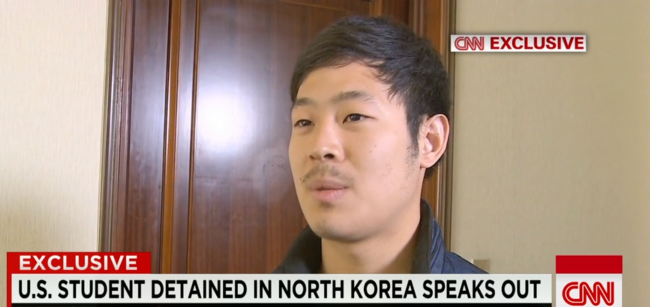by COURTNEY LEE
courtney@charactermedia.com
By now, you may have heard about Won-moon Joo, the New York University student who has been detained in North Korea since April 22. On Saturday, North Korean officials said they had arrested Joo, a South Korean national with permanent residency in the United States, for illegally entering the country from China last month. Joo’s interview with CNN, broadcast on Tuesday, is the first time we’ve caught a glimpse of the 21-year-old and heard him speak about his arrest.
In the interview, a seemingly relaxed Joo tells a CNN reporter he “wanted to be arrested,” that he thought his entry into North Korea could “have some good effect” on relations between the two Koreas and that he is “willing to accept any punishment” for his actions.
The brief interview may not have provided much clarity to a developing story. We realize there is a lot we still don’t know about the situation, but here is what we can gather so far about Joo and his circumstance:
What is Won-moon Joo’s background?
He was born in Seoul. His family moved to Wisconsin in 2001, and eventually settled in New Jersey. A former president of the Tenafly High School math club, Joo graduated from Tenafly in 2012, according to the Bergen Record. He then enrolled in New York University’s Stern School of Business, where he is currently a junior. Joo told CNN that he had taken a semester off from his junior year to travel across the U.S. and, unable to find work in California, decided to go to North Korea.
How did Joo cross into North Korea?
Joo told CNN he crossed into the country near the Great Wall of China in Dandong. He said he passed two barbed wire fences and farmland until he reached a river, where he was eventually detained by North Korean officers on April 22.
 Under Tiger Mountain, near the Great Wall. (Photo via Explore North Korea Tour Group)
Under Tiger Mountain, near the Great Wall. (Photo via Explore North Korea Tour Group)
Any idea why he did this?
It’s still not entirely clear. But Joo told CNN, “I thought that some great event could happen and hopefully that event could have a good effect on the relations between the north and [South Korea].” When CNN reporter Will Ripley asked Joo what “great event” he thought would happen, Joo replied, “I am not completely sure yet.”
What do we know about Joo’s treatment at the hands of North Korean authorities?
According to Joo, he’s been “fed well…slept well…and been very healthy.” “Of course I understand my parents and my loved ones are worrying a lot about me,” he says in the CNN interview, “but I would like to say that I’m well and there’s no need to worry because the people here have treated me with the best of humanitarian treatment.”
Joo also acknowledges on camera the illegality of his actions. “I did commit a wrong act so I understand that I cannot freely move around because I’m currently a criminal,” he says. On its website, CNN reported that Joo “smiled and seemed relaxed” when he entered the conference room in a Pyongyang hotel to do the televised interview. Although representatives from the North Korean government arranged the interview, it’s unclear if they were present while it took place.
 Lim Byeong-cheol, spokesman of the Ministry of Unification, urges North Korea to release Joo. (Photo via Yonhap)
Lim Byeong-cheol, spokesman of the Ministry of Unification, urges North Korea to release Joo. (Photo via Yonhap)
What are U.S. and South Korean officials doing in response to Joo’s arrest?
A spokesman for NYU told the Wall Street Journal that the university has been in touch with Joo’s family, the U.S. State Department and the South Korean embassy. A representative of South Korea’s Unification Ministry told NPR that it is “deeply regrettable” North Korea is detaining Joo “without any explanation to our government and his family.” Additionally, back in Joo’s home state, the Korean-American Association of New Jersey has urged elected state officials to help and has also reached out to the student’s family.
As a Green Card holder, could Joo have entered North Korea legally?
Not necessarily. The reclusive country allows U.S. citizens and foreigners to visit, provided that they are accompanied by official guides on organized tours and have a DPRK (Democratic People’s Republic of Korea) visa to enter North Korea. However, South Korean nationals generally cannot go to North Korea. If South Korean passport-holders are not permitted to travel to the North, neither are South Korean nationals who are permanent residents of the U.S., because they are still considered South Korean citizens.
Isn’t North Korea currently detaining other South Koreans?
Yes. In March, North Korea said that it had arrested two South Korean men, Kim Guk-gi, 60, and Choe Chun-gil, 55, on accusations of spying for South Korea’s National Intelligence Service (NIS). According to the New York Times, both men were living in Dandong when they crossed into the North. Both men also spoke with CNN in an interview televised Sunday. They said they worked for NIS, claimed they were being treated well and that they would accept any punishment. The NIS has called North Korea’s allegations against Kim and Choe “groundless” and has requested their release.
 Kenneth Bae released from his detainment in North Korea. (Photo by Ted S. Warren/AP Photo)
Kenneth Bae released from his detainment in North Korea. (Photo by Ted S. Warren/AP Photo)
What has happened with other recent detainments?
Last November, Kenneth Bae and Matthew Todd Miller, both U.S. citizens who had been detained in North Korea, were freed after the U.S. director of national intelligence was sent to negotiate their release. Bae, a Christian missionary, and Miller, who was on a private tour but destroyed his passport, were held for two years and seven months, respectively, and sentenced to a respective 15 and six years of farm labor.
Additionally, American Jeffrey Fowle was released in October after being detained for nearly six months for apparently leaving a Bible in a hotel. In 2013, Merrill Newman, an American, was released after spending a month in a North Korean jail. North Korean officials released a video of Newman confessing to such “crimes” as killing civilians and bringing into the country an e-book criticizing North Korea. Newman later said in U.S. interviews his confession was coerced.
___







